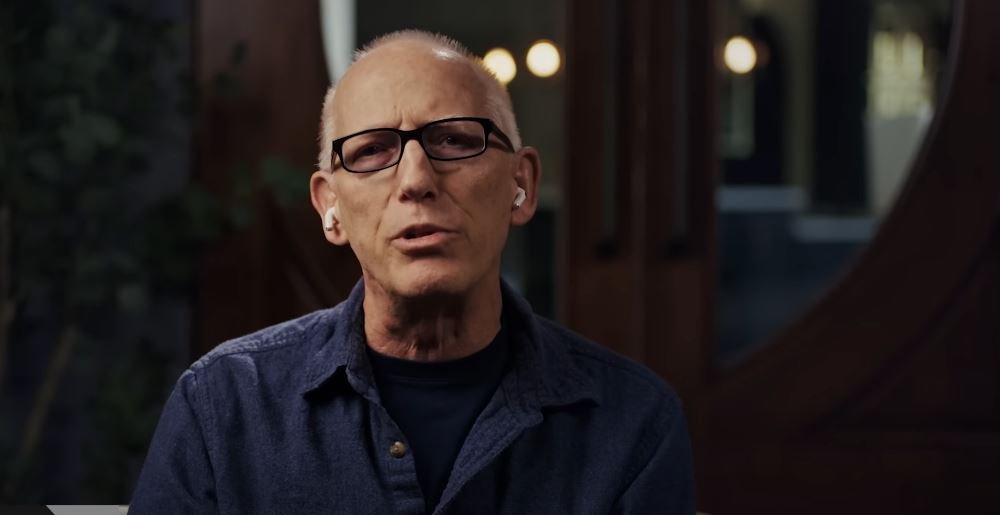
Scott Adams’ $20 million fortune is a testament to both his ability to adapt to changing times and his longstanding influence as a cartoonist. From humble beginnings in Windham, New York, Adams turned a few handwritten office jokes into Dilbert, a syndicated comic strip that resembled a corporate America cultural thermometer. He created a brand that branched out into books, merchandise, and animation by capturing the unsaid absurdities of office politics.
Adams’ entry into a variety of business endeavors has significantly increased his financial stability in recent years. He established Scott Adams Food, Inc., a vegetarian-friendly food company that produced products like the Dilberito, which demonstrated his especially creative approach to brand extension even though it was commercially short-lived. His TV and podcast appearances, such as Real Time with Bill Maher and The Joe Rogan Experience, increased his public visibility and provided a new source of income. Adams adopted multimedia in contrast to traditional cartoonists, demonstrating remarkable versatility across various platforms and formats.
Scott Adams Net Worth
| Name | Scott Raymond Adams |
|---|---|
| Date of Birth | June 8, 1957 |
| Birthplace | Windham, New York, United States |
| Education | Hartwick College (BA), UC Berkeley (MBA) |
| Occupation | Cartoonist, Author, Entrepreneur |
| Known For | Creator of Dilbert comic strip |
| Estimated Net Worth | $20 million (as of 2025) |
| Companies Founded | Scott Adams Food, Inc. |
| Marital History | Shelly Miles (2006–2014), Kristina Basham (2020–2022) |
| Current Residence | Danville, California |
| Health Status | Prostate cancer, diagnosed 2025 |
Adams developed an early routine that paid off in the long run by utilizing his corporate experience at Pacific Bell and his early morning discipline. Only $368.62 was the amount of his first royalty check from Dilbert; today, it seems to represent perseverance more than financial gain. The strip was appearing in hundreds of newspapers and growing by the mid-1990s. His commercial success further cemented his reputation as a dual-threat creative and commentator. His business book, The Dilbert Principle, was remarkably clear in its analysis of office dysfunction.
Adams’ financial situation improved in the late 1990s as a result of the animated Dilbert television series, which ran from 1999 to 2000. Despite its brief existence, it won a Primetime Emmy and was a shining example of how media adaptations can significantly increase brand value. Adams embraced commercialization, utilizing every avenue to increase his audience and income, in contrast to his contemporaries like Bill Watterson, who shunned it.
But not every move was successful. He even made fun of the infamous digestive side effects that plagued his attempt to launch the Dilberito. The attempt itself, in spite of the failure, highlights how creative professionals frequently move through a succession of audacious, if flawed, experiments. Adams viewed each failure as a launching pad rather than a destination, much like tech founders who change course after setbacks.
Adams shifted its focus to digital monetization during the last ten years. His Real Coffee with Scott Adams YouTube vlog, which offered real-time commentary on politics, persuasion, and social behavior, amassed millions of views. His analysis of persuasive strategies led him to predict that Donald Trump would win the 2016 election, which attracted attention and made his blog a lucrative media outlet. Adams demonstrated a highly effective model for independent content creators in a media landscape moving away from legacy syndication by working with platforms like Locals to turn free viewers into paying subscribers.
Controversy hit hard in 2023. Due to remarks made during his performance, Dilbert’s distributor fired him and major newspapers severed their ties with him. His wealth remained intact, but the incident severely hurt his reputation and income. For someone whose career had previously been based on satirical, rather than inflammatory, observation, it was a dramatic shift. Adams, however, showed a markedly enhanced resilience that many artists lose when their institutional support disappears by starting Dilbert Reborn on his own through the backlash.
Adams’s life changed in 2025 after he revealed he was fighting advanced prostate cancer, adding to his already difficult circumstances. Through his podcast, Adams candidly discussed the suffering and emotional toll, eliciting sympathy even from his former detractors. He pointed out the irony of being able to conclude matters “while the brain is still working,” adding a unique touch of emotion to a profession that relies heavily on witty repartee.
His announcement was made at the same time that President Joe Biden was diagnosed with prostate cancer, raising awareness of the illness nationwide and creating an unlikely connection between two men from very different backgrounds. Amazingly, this connection made Adams’ remarks more serious by serving as a reminder to his audience that health crises have the power to remove conflict, fame, and ideology, leaving only the human underneath.
Adams increased his wealth and influence by using calculated monetization and a willingness to speak candidly. His professional trajectory is especially representative of a larger trend in which traditional cartoonists such as Jim Davis and Charles Schulz flourished in print, but Adams expanded their influence into political commentary and business. Even as public sentiment shifted, his brand remained remarkably resilient due to its versatility.
Adams’ net worth is more than just financial value in the context of creative economies; it serves as a gauge for how content producers can change, falter, and resurface. His story also serves as a warning about how easily public opinion can shift, especially in the era of screenshots and livestreams. Despite all of his mistakes, he has managed to maintain his financial stability despite his declining health by continuing to produce, podcast, and publish.
